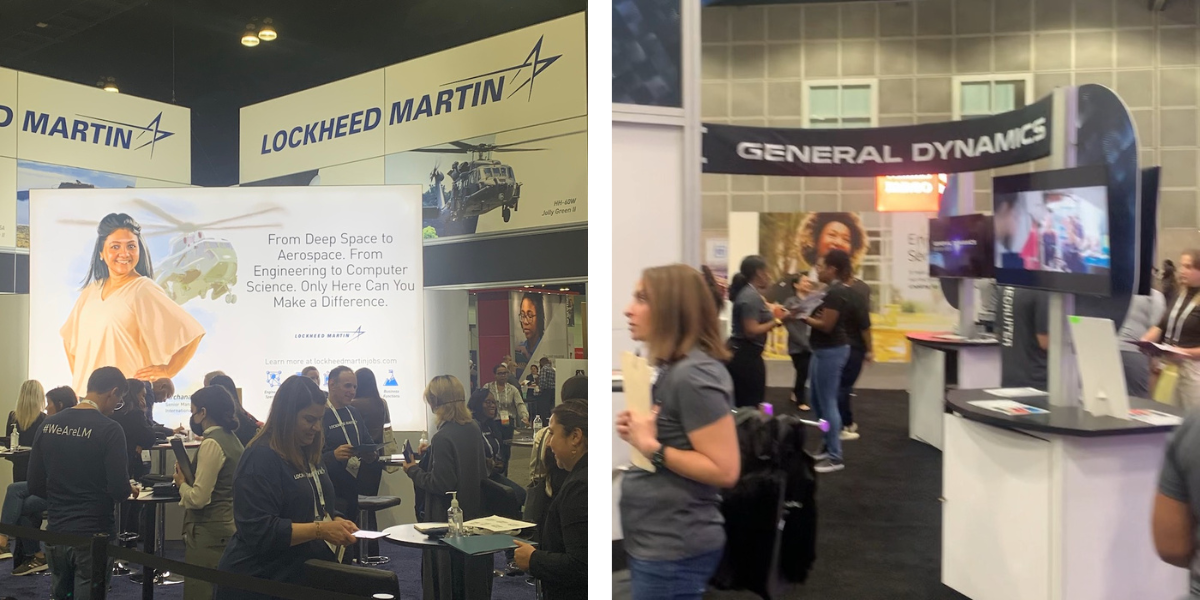Ethical data - it’s in the nuance, not the mechanics
Arriving at the Los Angeles Convention Center!
They gave me a theater to speak in?! I was happy to see the room filled with 60-70 people, half students, 25% early career, and 25% middle to late career, mostly US-based with at least a few from abroad.
by Cindy Lin
This past Friday, I presented “Our Responsibility to Build an Ethical Data Culture” at the annual Society of Women Engineers’ conference in Los Angeles. This session was a brief introduction on Data Equity and Ethics as it applies to the Data Culture Framework (developed by me at Cindy Lin Consulting), sharing unethical data practices and ways to counteract them. Much of the content was the application of principles learned in LA Tech4Good’s Data Equity workshop to my framework.
I was very pleased to speak with a multi-generational and disciplinary audience of STEM professionals and students, and even more pleased with the thoughtful questions I received from the audience. Some of these questions included how to apply the lessons I shared to their unique situations. Other questions requested more resources on additional guidelines and principles. This is an evolving space and relatively nascent. This is the moment to take advantage of the opportunities to create and iterate the frameworks and guidelines that will shape how we address these concerns moving into the future.
What about biased historical data?
One line of questioning I received is worth sharing. An attendee asked “When historical data is biased, how do you decide when to start over or work with the existing, biased data?” With a lot of questions when it comes to using data from an ethical and equitable lens, the answer is, it really depends. What is important is being thoughtful around what you are trying to do with that data and understanding what bias(es) exist in the data.
One of the tactics for working with this data is including additional perspectives, often from those that are being targeted in that data, in this data development process.
The other thing worth considering is questioning the institutions collecting this data in the first place and whether we should abolish those systems because the data they collect will always be inherently biased (example being crime statistics, which measures the enforcement of codified laws rather than all harm being perpetrated against individuals).
Remember, an Ethical Data Culture is one that centers the individuals at the forefront of your mind as you build out the infrastructure, processes, and practices around how you make data driven decisions. It is about more than the mechanics of using data; it is about understanding the nuances of how data we collect, present, and interpret reflects the realities of the society we exist in, good, bad, and everything in between.
These recruiters were difficult to stomach, to be honest | All photos courtesy of the author
Meanwhile, on the Expo floor
This conference took place on Oct 26-28, in the middle of the unjust and deadly war on Gaza and Palestinians by occupying Israeli forces. So I was very distressed to see the gigantic defense and aerospace companies at the conference, whose stock prices jumped when the war started. They hoped to recruit women engineers to support their war profits, and to use their valuable skills and unique perspectives in a manner that LA Tech4Good and I firmly oppose. I am especially angered by the attempts to sanitize their business activities through the guise of female empowerment. We would prefer to see future events where participants are not expected to share space with these corporations and their nefarious end goals.
In conclusion
I had a great experience both presenting to and engaging in conversation with conference participants, and appreciate the opportunity to do so. But clearly, I could not ignore events outside the Convention Center half way around the world. My hope is that women engineers will align their professional goals with the best interests of humankind and make sure that your work contributes toward that.
Our Responsible Data and Women in AI mixer
We hosted a mixer on Responsible Data and Women in AI with some of the SWE speakers and it was a blast, with awesome, talented, passionate folks who came to mix and mingle. Here’s what a few attendees had to say:
❝I concluded with an amazing after-party hosted by LA Tech4Good, where I had the pleasure of meeting… talented women who are making a significant impact in their field. It was truly an inspiring and empowering experience, reminding me of the incredible contributions women make to the engineering world.❞
❝ I was surrounded by a diverse and supportive community that is passionate about data science and ethics. I left the event with a renewed sense of purpose and motivation to continue advocating for ethical and inclusive practices in technology.❞
❝ I had the privilege of meeting some amazing women in tech. Thank you for sharing wisdom and encouragement! Speaking with so many ambitious women in the tech industry was very motivational.❞
❝Had a wonderful time on Thursday. It's awesome building relationships and support systems to help each other out!❞
My First Society of Women Engineers Experience: Navigating the WE23 Conference
Himani Gaur, a first-time conference attendee, came to this mixer because of her first tip for navigating conferences: Challenge yourself to attend random networking sessions., and wrote this piece.
“Don’t be afraid to explore events or meetings that may not align directly with your field; these can lead to unexpected and inspiring connections… So many wonderful women from various backgrounds... these spontaneous interactions... can lead to some of the most meaningful connections.”
Himani is spot on when she writes: "Data is intrinsically linked to individuals, which highlights the need for accountability, privacy, and equity."





